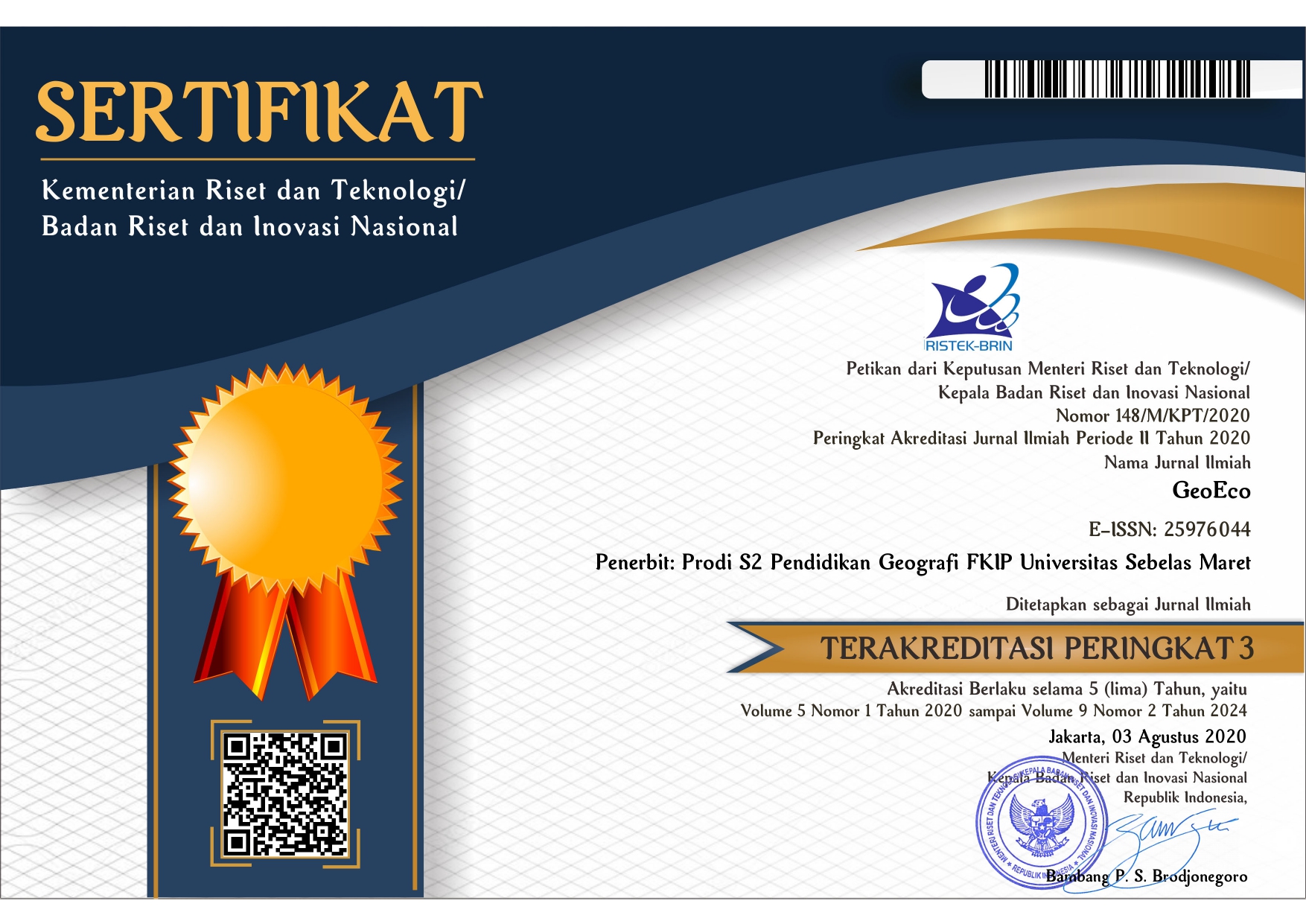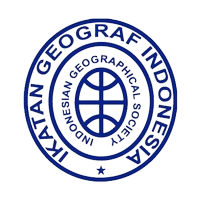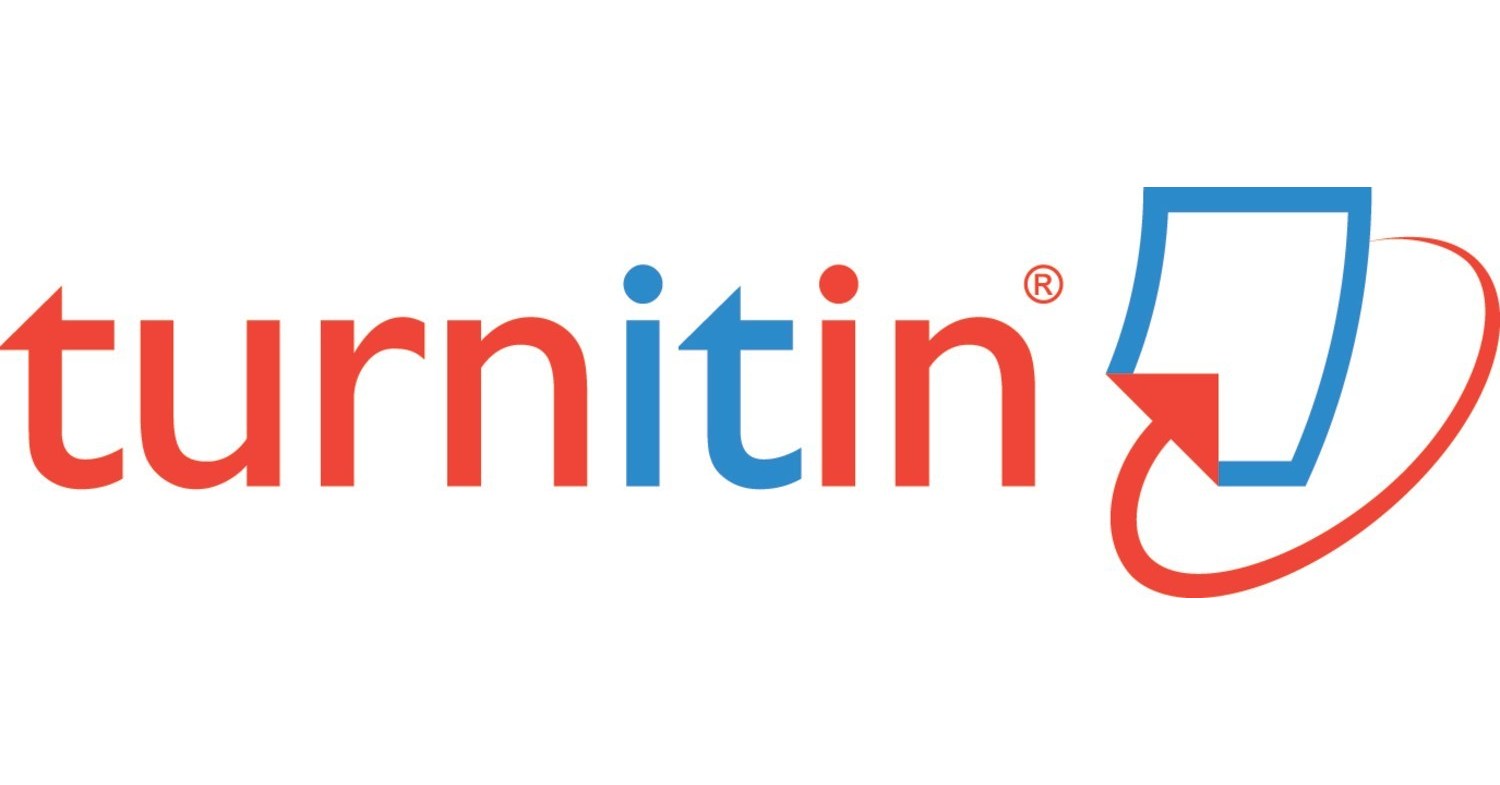EXPLORING SOCIOECONOMIC VULNERABILITY OF TRADITIONAL MARKET SELLERS TO COVID-19 PANDEMIC
Abstract
Traditional market as a major resource of inexpensive goods for countless middle and low-income classes as well as an essential source of livings for many persons is one of the crowded places having high risk of SARS-CoV-2 virus (COVID-19) transmission. In a one hand, working in packed, precarious conditions, and becoming sick due to COVID-19 will have devastating effects on sellers’ entire households. In the other hand, markets must remain open so that customers may buy goods and sellers and their supply chains may preserve their livings. By taking location in Gede Market, Cilacap Regency, Central Java Province, this research aims (i) to analyze the social and economic vulnerability of sellers to COVID-19 pandemic, and (ii) to identify the coping strategy of sellers to deal with COVID-19 pandemic. Quantitative and qualitative data were retrieved towards 50 traditional market sellers and related keypersons. AHP (Analytical Hierarchy Process) was used to measure the weight of each variable and factor of social and economic vulnerability. Multi scenarios analysis of socioeconomic vulnerability were conducted (social scenario, economic scenario, and equal scenario) resulting 18 percent, 48 percent, and 34 percent respondents having high level of vulnerability, respectively. There are as many as 18 percent of respondents who are always categorized in high vulnerability regardless of the scenario. Different coping strategies used by sellers to deal with economic problems during COVID-19 Pandemic such as reducing the number of commodities, conducting online selling, saving expenses, borrowing money, reducing the number of workers, transforming the fresh food commodities (perishable goods) into frozen food (more durable goods), and selling the commodities around neighborhood. However, this study also observed that some respondents did not undertake any coping strategy.
Keywords
Full Text:
PDFReferences
Ansah, I. G. K., Gardebroek, C., & Ihle, R. (2020). Shock interactions, coping strategy choices and household food security. Climate and Development, 1–13. https://doi.org/10.1080/17565529.2020.1785832
Armansyah, & Taufik, M. (2020). Jurnal Ilmu Administrasi Publik Strategi Pelaku Usaha Informal Offline dan Online Menghadapi Pandemi Covid-19 di Kota Palembang. PUBLIKAUMA: Jurnal Ilmu Administrasi Publik UMA, 8(1), 137–145. https://doi.org/10.31289/publika.v8i2.4484
Birkmann, J. (2013). Measuring vulnerability to natural hazards (J. Birkmann, Ed.; 1st ed., Vol. 1). United Nations University Press. https://collections.unu.edu/eserv/UNU:2880/n9789280812022_text.pdf
Cutter, S. L., Boruff, B. J., & Shirley, L. W. (2003). Social Vulnerability to Environmental Hazards. Social Science Quarterly, 84(2), 242–261.
Fandir, A. (2017). Analisis Multi Skala Kerentanan Fisik, Sosial, Ekonomi, Dan Lingkungan Di Kawasan Rawan Bencana Piroklastik Gunungapi Kelud (Kecamatan Ngantang, Kabupaten Malang, Jawa Timur). Tesis.
Gaillard, J. C., & Texier, P. (2010). Religions, natural hazards, and disasters: An introduction. Religion, 40(2), 81–84. https://doi.org/10.1016/j.religion.2009.12.001
Komara, B. D., Cahyo, H., & Setiawan, B. (2020). Jalan Terjal UMKM dan Pedagang Kecil Bertahan di Tengah Pandemi Covid-19 dan Ancaman Krisis Ekonomi Global. Jurnal Manajemen Bisnis, 17(3). http://journal.undiknas.ac.id/index.php/magister-manajemen/
Lotfi, M., Hamblin, M. R., & Rezaei, N. (2020). COVID-19: Transmission, prevention, and potential therapeutic opportunities. In Clinica Chimica Acta (Vol. 508, pp. 254–266). Elsevier B.V. https://doi.org/10.1016/j.cca.2020.05.044
Mei, E. T. W. (2013). Gestion Des Evacuations Lors Des Crises Volcaniqes : Etude de Cas Du Volcan Merapi, Java, Indonesie. Thèse Doctorale, Université(Ecole Doctorale de Géographie), 333. https://tel.archives-ouvertes.fr/tel-01001681/file/2013-07_-_MEI_-_Ges.pdf
Mei, E. T. W., Meilyana Sari, I., Fajarwati, A., & Safitri, D. (2017). Assessing the Social Economic and Physical Vulnerabilities to Gamalama Volcano. Advances in Social Science, Education and Humanities Research. 1st International Conference on Geography and Education (ICGE 2016). https://www.atlantis-press.com/article/25875168.pdf
Murakami, E. (2017). ADBI Working Paper Series HOUSEHOLD CONSUMPTION RISK AND COPING STRATEGIES IN TAJIKISTAN: EVIDENCE FROM HOUSEHOLD SURVEYS Asian Development Bank Institute. https://www.adb.org/publications/household-consumption-risk-and-
Ouassou, H., Kharchoufa, L., Bouhrim, M., Daoudi, N. E., Imtara, H., Bencheikh, N., Elbouzidi, A., & Bnouham, M. (2020). The Pathogenesis of Coronavirus Disease 2019 (COVID-19): Evaluation and Prevention. In Journal of Immunology Research (Vol. 2020). Hindawi Limited. https://doi.org/10.1155/2020/1357983
Purbawati, C., & Nurul Hidayah, L. (2020). Dampak Social Distancing terhadap Kesejahteraan Pedagang di Pasar Tradisional Kartasura pada Era Pandemi Korona. https://doi.org/http://dx.doi.org/10.31604/jim.v4i2.2020.156-164
Sari, I. M., Fajarwati, A., & Mei, E. T. W. (2015). Tingkat Kerentanan Sosial Ekonomi Petani Terhadap Jatuhan Piroklastik Gunungapi (Kasus : Desa Ngargomulyo, Kecamatan Dukun, Kabupaten Magelang). Jurnal Bumi Indonesia, 4(3). https://www.neliti.com/publications/222996/tingkat-kerentanan-sosial-ekonomi-petani-terhadap-jatuhan-piroklastik-gunungapi#cite
United Nations. (2004a). Living with Risk Living with Risk A global review of disaster reduction initiatives A global review of disaster reduction initiatives ISDR International Strategy for Disaster Reduction (Volume II).
United Nations. (2004b). Living with Risk Living with Risk A global review of disaster reduction initiatives A global review of disaster reduction initiatives (Volume I).
Refbacks
- There are currently no refbacks.












.png)

